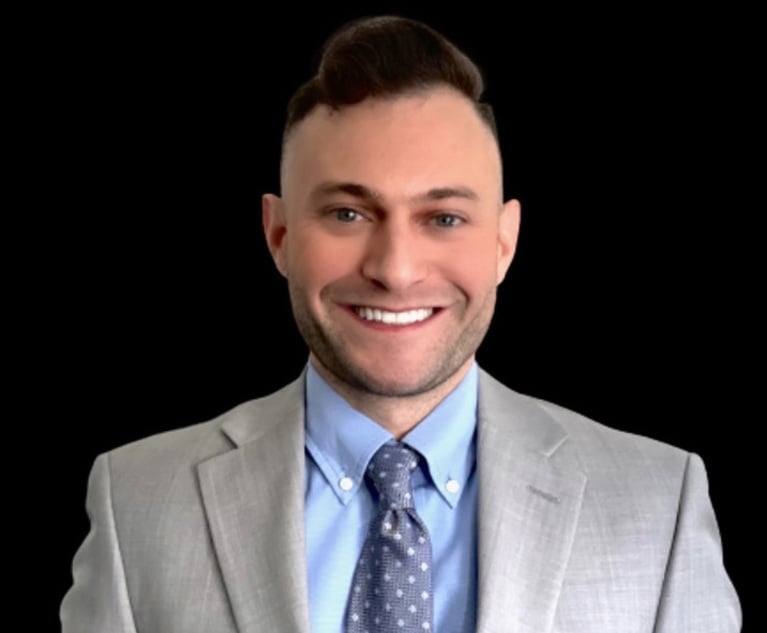Elizabeth Holmes' Lawyer Assails Theranos Prosecution as 'Massive Case With Undefined Contours'
Williams & Connolly's Amy Saharia said prosecutors had used "fudging language" in the indictment of the former Theranos chief to keep the charges as "broad as they can possibly be so they can shift their theory as they go along."
February 10, 2020 at 05:25 PM
4 minute read
 Elizabeth Holmes and attorneys from Williams & Connley head into the Northern District on Monday, January 13. (Photo: Jason Doiy/ALM)
Elizabeth Holmes and attorneys from Williams & Connley head into the Northern District on Monday, January 13. (Photo: Jason Doiy/ALM)
SAN JOSE — The federal judge overseeing the criminal wire fraud case against Theranos founder Elizabeth Holmes and the company's former COO and president Ramesh Balwani didn't tip his hand during defense lawyers' arguments Monday seeking to knock out criminal charges.
Federal prosecutors have claimed the pair misled investors and patients, and that Holmes and Balwani knew Theranos' blood analyzer could not deliver on the public promises they were making to provide "fast, inexpensive, accurate, and reliable" tests.
But at a hearing Monday, U.S. District Judge Edward Davila did indicate he is skeptical of the government's contention that the alleged scheme's victims include doctors and patients whose blood testing services were paid for by insurance.
"I look at this and, candidly, I think they don't appear to be victims," said Davila toward the end of two-plus hours of arguments on defense motions to dismiss the case. Davila, however, stopped short of ruling, and said that, for now, the case will move forward on its current schedule, with a trial set to begin in August.
Holmes and Balwani were initially indicted in July 2018 on two counts of conspiracy to commit wire fraud and nine counts of wire fraud based on claims they knew Theranos' blood analyzer could not deliver on their promises to investors and patients.
Holmes' lawyers at Williams & Connolly asked Davila to knock out the indictment or, alternatively, prod the government for more specifics on its theory and proof in three separate motions filed in December, which were joined by Balwani's lawyers at Orrick, Herrington & Sutcliffe.
Williams & Connolly's Amy Saharia, who handled the lion's share of defense arguments Monday, called the prosecution a "massive case with undefined contours." The government, she said, has handed over 2 million documents in discovery and identified more than 300 articles about the company and 35 recorded presentations by Holmes during the relevant period, but has so far declined to identify any single statement it alleges was false or misleading. She said government prosecutors used "fudging language" in the indictment to keep the charges as "broad as they can possibly be so they can shift their theory as they go along." In particular, she said that prosecutors charged Holmes with knowing that her tests didn't "consistently" provide reliable results without providing a definition of what "consistently" means.
Orrick's Stephen Cazares also argued that the charges lacked the specificity necessary for his client to prepare a defense. "We need some definition and to the extent that the government doesn't want to define 'accuracy' and 'reliability'" that's problematic, he said.
Arguing for the government, Assistant U.S. Attorney John Bostic cautioned the judge that the defense lawyer wouldn't be happy with any version of the indictment since it was charging their clients with a scheme to mislead investors and patients about the viability of the company and its tests. He also argued the government doesn't have an obligation to detail the evidence it will introduce at trial in the indictment, and must only provide the defendants with notice of the crimes they are accused of committing to avoid possible double jeopardy.
"They encouraged patients and doctors to use these tests to make clinical decisions," Bostic said. "This was about giving patients valuable medical information that they could use and that their doctors could use to make decisions about health care."
Read more:
Theranos Prosecutors: 'Common Sense' Only Thing Needed to Understand Charges Against Holmes
FDA's Top Lawyer Says Theranos Case Places 'Unprecedented' Discovery Strain on Agency
Lawyers for Elizabeth Holmes Make Dismissal Bid in Theranos Criminal Case
Judge to Let Cooley Bow Out of Representing Elizabeth Holmes in Theranos Civil Case
In Theranos Civil Case, Cooley Says Elizabeth Holmes Has Growing Unpaid Legal Bill
Orrick Adds White-Collar Trio, Including Ex-Theranos COO's Lawyer
This content has been archived. It is available through our partners, LexisNexis® and Bloomberg Law.
To view this content, please continue to their sites.
Not a Lexis Subscriber?
Subscribe Now
Not a Bloomberg Law Subscriber?
Subscribe Now
NOT FOR REPRINT
© 2025 ALM Global, LLC, All Rights Reserved. Request academic re-use from www.copyright.com. All other uses, submit a request to [email protected]. For more information visit Asset & Logo Licensing.
You Might Like
View All
'Pull Back the Curtain': Ex-NFL Players Seek Discovery in Lawsuit Over League's Disability Plan

'Be Comfortable Being Uncomfortable': Pearls of Wisdom From 2024 GC Q&As


Insurers Dodge Sherwin-Williams' Claim for $102M Lead Paint Abatement Payment, State High Court Rules
Law Firms Mentioned
Trending Stories
- 1‘Catholic Charities v. Wisconsin Labor and Industry Review Commission’: Another Consequence of 'Hobby Lobby'?
- 2With DEI Rollbacks, Employment Lawyers See Potential For Targeting Corporate Commitment to Equality
- 3In-House Legal Network The L Suite Acquires Legal E-Learning Platform Luminate+
- 4In Police Shooting Case, Kavanaugh Bleeds Blue and Jackson ‘Very Very Confused’
- 5Trump RTO Mandates Won’t Disrupt Big Law Policies—But Client Expectations Might
Who Got The Work
J. Brugh Lower of Gibbons has entered an appearance for industrial equipment supplier Devco Corporation in a pending trademark infringement lawsuit. The suit, accusing the defendant of selling knock-off Graco products, was filed Dec. 18 in New Jersey District Court by Rivkin Radler on behalf of Graco Inc. and Graco Minnesota. The case, assigned to U.S. District Judge Zahid N. Quraishi, is 3:24-cv-11294, Graco Inc. et al v. Devco Corporation.
Who Got The Work
Rebecca Maller-Stein and Kent A. Yalowitz of Arnold & Porter Kaye Scholer have entered their appearances for Hanaco Venture Capital and its executives, Lior Prosor and David Frankel, in a pending securities lawsuit. The action, filed on Dec. 24 in New York Southern District Court by Zell, Aron & Co. on behalf of Goldeneye Advisors, accuses the defendants of negligently and fraudulently managing the plaintiff's $1 million investment. The case, assigned to U.S. District Judge Vernon S. Broderick, is 1:24-cv-09918, Goldeneye Advisors, LLC v. Hanaco Venture Capital, Ltd. et al.
Who Got The Work
Attorneys from A&O Shearman has stepped in as defense counsel for Toronto-Dominion Bank and other defendants in a pending securities class action. The suit, filed Dec. 11 in New York Southern District Court by Bleichmar Fonti & Auld, accuses the defendants of concealing the bank's 'pervasive' deficiencies in regards to its compliance with the Bank Secrecy Act and the quality of its anti-money laundering controls. The case, assigned to U.S. District Judge Arun Subramanian, is 1:24-cv-09445, Gonzalez v. The Toronto-Dominion Bank et al.
Who Got The Work
Crown Castle International, a Pennsylvania company providing shared communications infrastructure, has turned to Luke D. Wolf of Gordon Rees Scully Mansukhani to fend off a pending breach-of-contract lawsuit. The court action, filed Nov. 25 in Michigan Eastern District Court by Hooper Hathaway PC on behalf of The Town Residences LLC, accuses Crown Castle of failing to transfer approximately $30,000 in utility payments from T-Mobile in breach of a roof-top lease and assignment agreement. The case, assigned to U.S. District Judge Susan K. Declercq, is 2:24-cv-13131, The Town Residences LLC v. T-Mobile US, Inc. et al.
Who Got The Work
Wilfred P. Coronato and Daniel M. Schwartz of McCarter & English have stepped in as defense counsel to Electrolux Home Products Inc. in a pending product liability lawsuit. The court action, filed Nov. 26 in New York Eastern District Court by Poulos Lopiccolo PC and Nagel Rice LLP on behalf of David Stern, alleges that the defendant's refrigerators’ drawers and shelving repeatedly break and fall apart within months after purchase. The case, assigned to U.S. District Judge Joan M. Azrack, is 2:24-cv-08204, Stern v. Electrolux Home Products, Inc.
Featured Firms
Law Offices of Gary Martin Hays & Associates, P.C.
(470) 294-1674
Law Offices of Mark E. Salomone
(857) 444-6468
Smith & Hassler
(713) 739-1250






